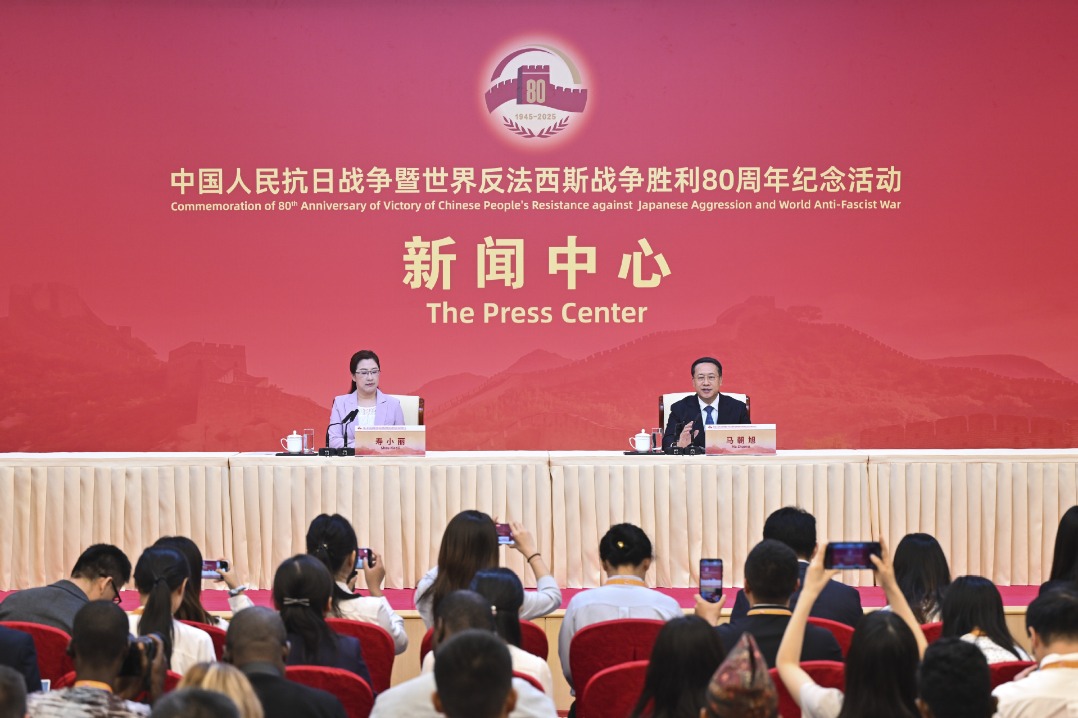ETFs hit new high on Shanghai Stock Exchange
Instrument has played key role in bringing long-term capital into system

Ever since China's first exchange-traded fund was introduced on the Shanghai Stock Exchange in 2004, huge progress has been seen in the sector, helping investors diversify risks and propelling the maturity of the Chinese capital market.
Data from the Shanghai bourse showed that the market value of ETFs on the SSE hit a record 1 trillion yuan ($153 billion) by the end of March. The total value of ETFs in Shanghai spiked 56.6 percent year-on-year to reach 10.68 trillion yuan in 2020, making up 82.2 percent of all ETFs that changed hands in China last year.
Ye Wu, deputy head of the product innovation center at the Shanghai Stock Exchange, explained that the number of products introduced in the Chinese market over the past few years-including cross-market ETFs, cross-border ETFs and commodities ETFs-h(huán)ave attracted a growing number of new investors, which also resulted in rapid growth that the Chinese ETF industry has made.
"The compound annual growth rate of the global ETF industry has been over 20 percent over the past decade. As an index investing tool, ETFs have been widely adopted by investors all over the world to allocate assets and manage risks thanks to high efficiency, low costs and little deviation from indexes," Ye said.
ETFs have played an important role in introducing long-term capital into the market. There were more than 6 million participant ETF accounts last year, which was twice the number in 2019. The majority of investors were institutions such as legal entities, funds and insurance companies, said the Shanghai bourse.
The increased number of institutional investors in the ETF industry will enhance market efficiency over the long term, said Xu Meng, director of the quantitative investment department at China Asset Management.
Institutional investors will bring in derivatives, facilitate the development of investment consulting and apply more asset allocation methods, which are all conducive to the long-term development of the ETF industry. While institutions will become the major ETF investors, individuals will make their ETF allocations with the help of investment consultants. Therefore, one-stop asset allocation services will be crucial for fund companies in China, Xu said.
Efforts have been made regarding innovation in ETFs. The first batch of four ETFs tracking the technology-focused STAR Market 50 Index was issued in November. The products were highly sought after, with 1.5 million accounts constituting a total subscription of over 100 billion yuan. Therefore, proportional allotment was adopted for the four ETFs, which was the first time in the market's history, with an initial offering of more than 21 billion yuan.
The first four Shanghai gold ETFs were issued in February 2020. With an initial offering of over 1.5 billion yuan, the ETFs have helped to boost the trade of gold commodities on the spot market. The first convertible bond ETFs started trading on the Shanghai bourse last April, with the initial offering exceeding 600 million yuan.
Ever since the beginning of this year, ETFs focused on online games, nonferrous metals, rare earths and fintech have been introduced into the market.
ETFs have also become an important bridge linking the domestic and international markets. In June, HuaAn Fund launched on the Shanghai bourse's CAC40 ETF, which was the first domestic ETF tracking mainstream index in the French market. As one of the three major stock indexes in the European market, CAC40 is composed of industry big names such as Louis Vuitton, L'Oreal and Airbus.
The Shenzhen Stock Exchange and Japan Exchange Group Inc inked a memorandum of understanding on Jan 25 to build an ETF connect program. The China-Japan ETF Connectivity program first kicked off in Shanghai with the four China-Japan ETF connectivity products starting trading on the Shanghai bourse in late June 2019.
In late October, the Shenzhen-Hong Kong ETF connect program was officially launched, with the Shenzhen and Hong Kong exchanges each having two ETFs listed.
The records seen last year and the number of innovative trading mechanisms only mark the beginning of even faster growth of the Chinese ETF industry, experts said.
On the one hand, more products are in the pipeline. The Shanghai bourse said in a news release in late March that continued efforts will be made to further enrich its ETF product portfolio and expand the scope of the ETF connect mechanism. Its Shenzhen counterpart said at the end of last year that it will speed up the launch of ETF options tailor-made for the tech-heavy ChiNext board.
On the other hand, there is still much room for growth in general. Data from social and trading platform Xueqiu, or Snowball Finance, showed that there were about 371 ETFs in China last year, which was only 15 percent of the total number reported in the United States in 2020.
Given the ratio that ETFs take in the mutual funds market, the gap between China and the US means that the Chinese ETF industry will likely expand by four times in the near future, said Xueqiu's CEO Li Nan.
Although the underlying assets of ETFs in the Chinese market have covered stocks, bonds, commodities and currencies, innovation is still needed for fixed income ETFs, active ETFs, foreign exchange ETFs and structured products, said Ye of the Shanghai Stock Exchange.
Experiences from the US showed that actively managed products have witnessed net capital outflow since 2008, with the total outflow reaching $1.7 trillion in 10 years' time, said Zhao Yonggang, research and development director of China Securities Index Co Ltd. The trend shows that a growing number of investors have shown preference for index products to allocate assets or manage wealth, he said.
Zhao said lower trading expenses represent one major reason for mature investors' attraction to index investing. Meanwhile, the more transparent ways that indexes are compiled help investors better manage investment behavior and lower risk, he added.
China International Fund Management Co Ltd and Xueqiu released the 2020 China ETF Investors Insight report at the end of last year after polling a total of 13,113 candidates. As the report discovers, Chinese ETF investors are relatively better educated as 20 percent hold a master's degree, which is twice the number as ordinary investors. ETF investors are also more seasoned as 90 percent have previous investment experience. The average amount devoted to ETF investments topped over 1 million yuan, which was much higher than that for actively managed funds.
Hu Di, index and quantitative investment director at China International Fund Management, said that more investors will choose passive index products as the A-share market further opens up and long-term capital such as social security, insurance and foreign investment flows in. The market will become increasingly effective and ETFs will witness rapid development in China.
"As Chinese household assets are differently structured, ETFs will become increasingly important tools for investors in China," Hu said.


Today's Top News
- Xi chairs meeting on ideological work, draft ethnic unity law
- Digital tech boom offers opportunities
- Expo attracts all Arab nations
- Uzbekistan and SCO: Cooperation for global peace and prosperity
- Industrial upgrade pivots on digital tech
- SCO summit media center begins operation





























